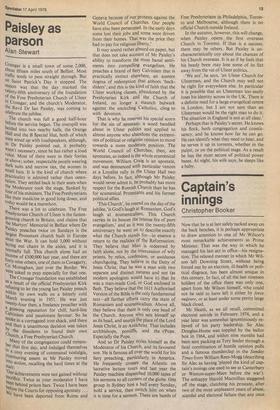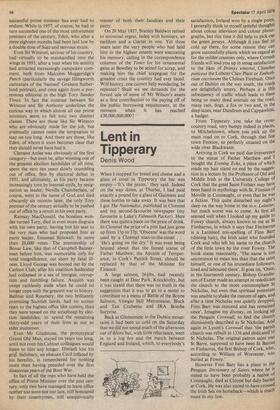Captain's innings
Christopher Booker
Now that he is at last safely tucked away on the back benches, it is perhaps appropriate to draw attention to one of Mr Wilson's most remarkable achievements as Prime Minister. That was the way in which he managed his last act in office—his resignation. The relaxed manner in which Mr Wilson left Downing Street, without being forced out by an election, ill-health or political disgrace, has been almost unique in this century. In fact, of all the last nineteen holders of the office there was only one, apart from Mr Wilson himself, who could not be said to have left it either by force majeure, or at least under some pretty large black cloud.
Mr Heath, as we all recall, committed electoral suicide in February 1974, and a year later was somewhat ignominiously relieved of his party leadership. Sir Alec Douglas-Home was toppled by the ballot box in 1964, and within nine months had been sent packing as Tory leader through a fatal combination of hostile opinion polls and a famous thunderclap in the Sunday Times from William Rees-Mogg (describing Sir Alec as having 'played the kind of captain's innings one used to see at Canterbury or Weston-super-Mare before the war'). The unhappy Harold Macmillan staggered off the stage, clutching his prostate, after two of the most unpleasant years of abuse, scandal and electoral failure that any once
successful prime minister has ever had to endure. While in 1957, of course, he had in turn succeeded one of the most unfortunate premiers of the century, Eden, who after a mere eighteen months had been laid low by a double dose of Suez and nervous strain.
Even Sir Winston, saviour of his country, had virtually to be manhandled into the wings in 1955, after a year when his senility had attracted increasingly outspoken comment, both from Malcolm Muggeridge's Punch (particularly the savage Illingworth caricature of the `banned' Graham Sutherland portrait), and once again from a portentous editorial in the high Tory Sunday Times. In fact the contrast between Sir Winston and Sir Anthony underlines the curious way in which almost all our prime ministers seem to fall into two distinct classes. There are those like Sir Winston who are obviously made for the job, but eventually cannot resist the temptation to stay on too long. And there are those, like Eden, of whom it soon becomes clear that they should never have had it.
Clement Attlee was obviously of the first category—but even he, after winning one of the greatest election landslides of all time, spent the next ten years slowly crumbling out of office, first by electoral defeat in 1951, and ultimately, as his party became increasingly torn by internal strife, by resignation as leader. Neville Chamberlain, of course, went in the name of God and died obscurely six months later, the only Tory premier of the century actually to be pushed out of office by a revolt in his own party.
Ramsay MacDonald, the boneless wonder turned Tory, died in even more disgrace with his own party, having lost his seat to the very man who had proposed him as party leader, Emanuel Shinwell, by more than 20,000 votes. The premiership of Sonar Law, like that of Campbell-Bannerman before him, was memorable only for total insignificance, cut short by fatal illness. Lloyd George was booted out by the Carlton Club, after his coalition leadership had collapsed in a sea of intrigue, corruption and fumbling failure. Asquith was swept ruthlessly aside when he could no longer cope with the greatest war in history. Balfour and Rosebery, the two brilliantly promising Scottish lairds, had no sooner risen to the highest office like comets, than they were tossed on the scrapheap. by election landslides, to spend the remaining thirty-odd years of their lives as not so elder statesmen.
Even Mr Gladstone, the prototypical Grand Old Man, stayed on years too long, until not even his Cabinet colleagues would listen to him any longer. Disraeli lost his Salisbury, an obscure Cecil inflated by his heredity, is remembered for nothing more than having presided over the first disastrous years of the Boer War.
In fact of all the men who have held the office of Prime Minister over the past century, only two have managed to leave office neither too soon nor too late, still honoured by their countrymen, still unequivocally master of both their faculties and their party.
On 28 May 1937, Stanley Baldwin retired to universal regret, laden with honours, an earldom and a Garter in one. Yet three years later the very people who had held him in the highest esteem were execrating his memory, calling in the correspondence columns of the Times for his ornamental gates at Bewdley to be seized for scrap, and making him the chief scapegoat for the greatest crisis the country had ever faced. Will history, one cannot help wondering, be repeated ? Shall we see demands for the forced sale of some of Mr Wilson's assets as a first contribution to the paying off of the public borrowing requirement, at the moment when it has reached £30,000,000,000?



































 Previous page
Previous page